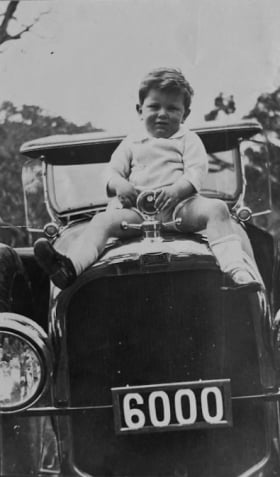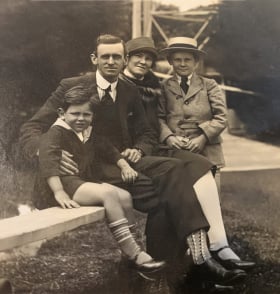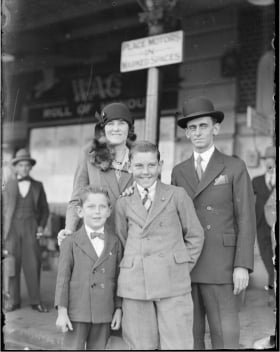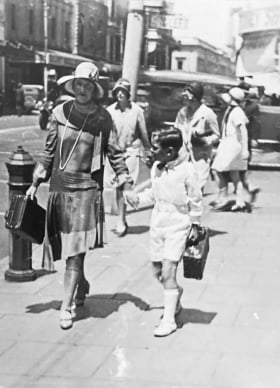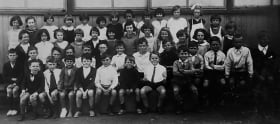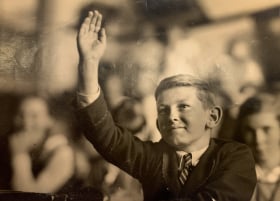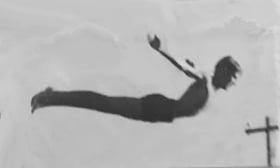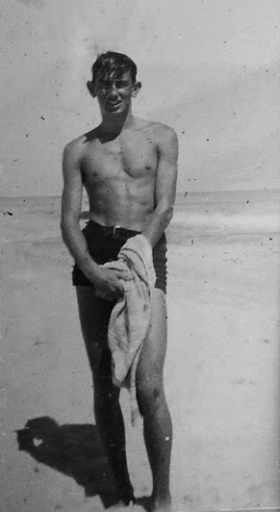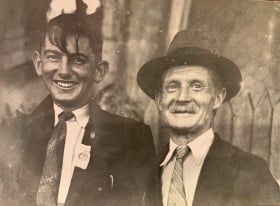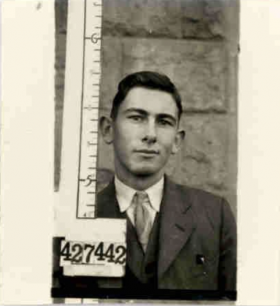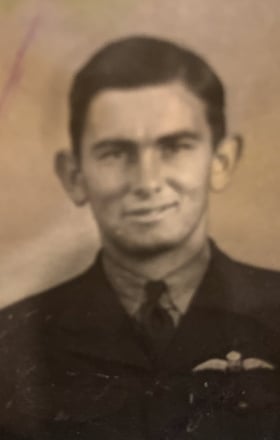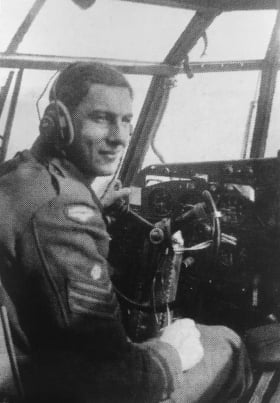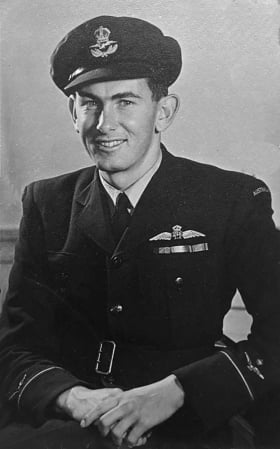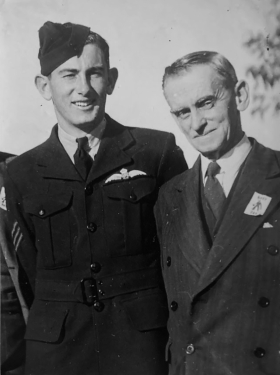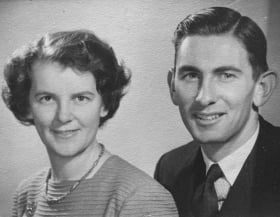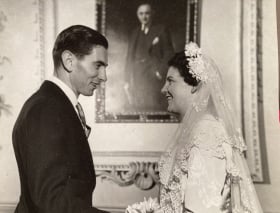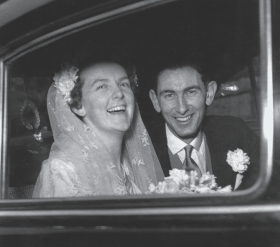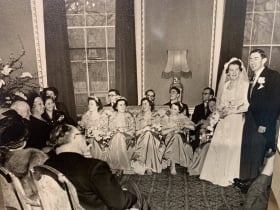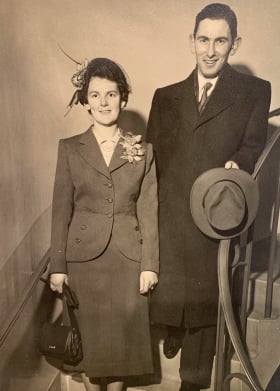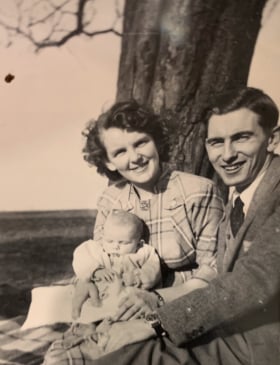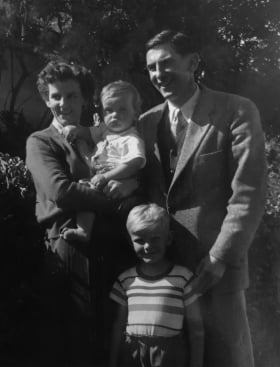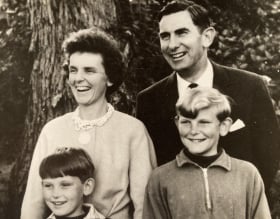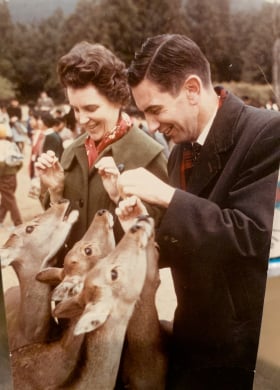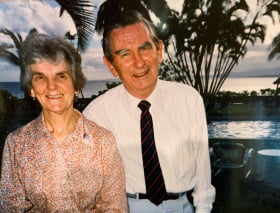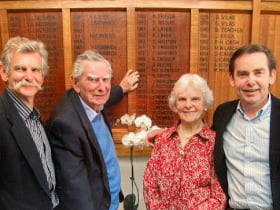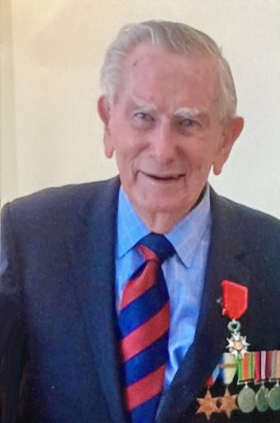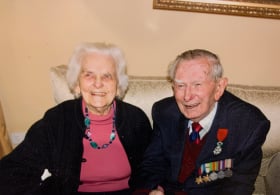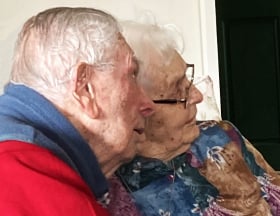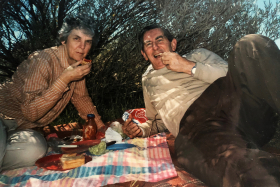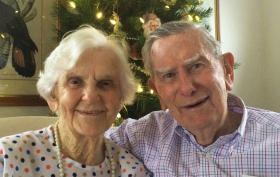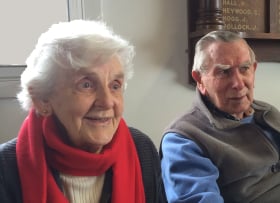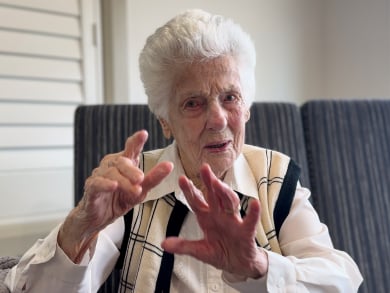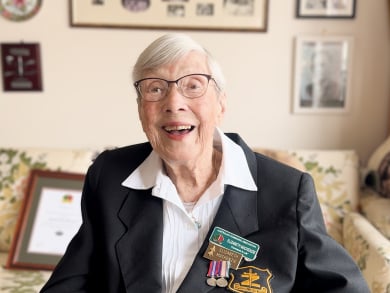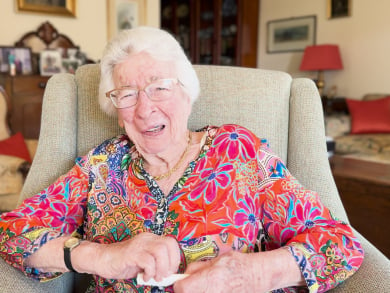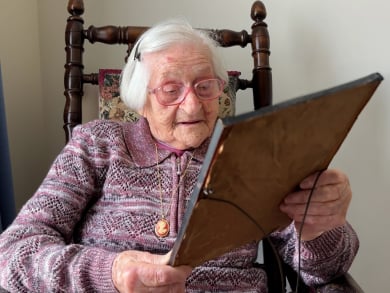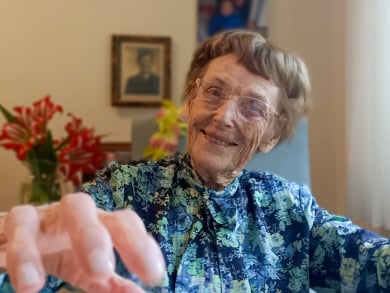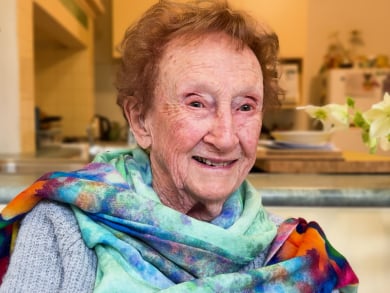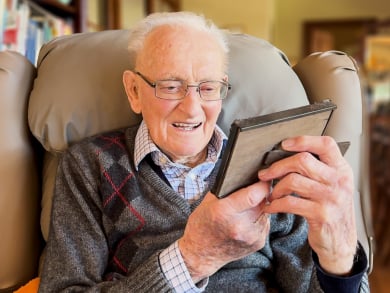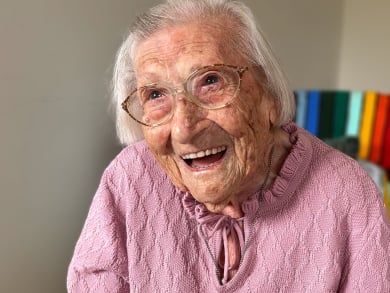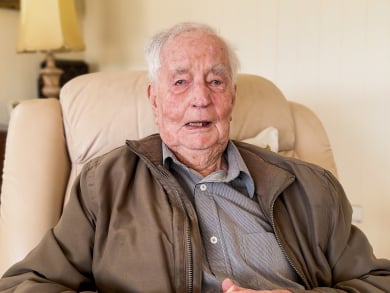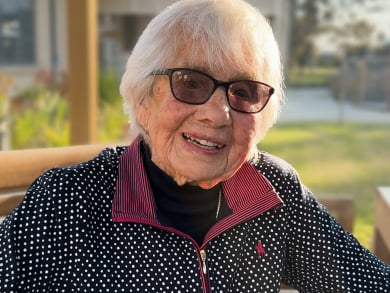Jim Coulter.
Born in Perth
in 1922.
100
and
so far, so good.
My father,
John McCrae Coulter was the first person
"to show motion pictures
in Western Australia."
So free movies every Friday night.
Not every Saturday night.
His first cinema was the Capitol Theater.
"That was an independent
that Dad and another person launched."
"It was, you know, the Depression years
and so instead of getting usherettes"
he got ushers. And something like
three or five thousand
lined up and went round and Dad said,
"“Every one of you will be interviewed
and you'll all have an equal chance”."
There were 30 jobs.
"That was the picture of the Depression
for me."
"Theater managers and bookmakers,
I think, were"
"the ones that were never broke
because people had to have a turn up."
I was dolled up like, you know,
clothes and shoes and so on.
"In the school photos
you see quite a lot of them without shoes."
"My mother, I have very fond memories,
but I was seven when she died."
Pleurisy and pneumonia.
No antibiotics in those days.
"So they came with
what they called ‘the crisis’."
And you either got through or you didn't.
And she didn't, you know.
"So a little bit later
Rose came onto the scene."
They married and she became my stepmother.
"We were both competing for Dad's
affections and also she came from a"
pretty tough background and
I [could] be
"described as a ‘smart alec’ rather,
and so,"
"you know, we were sort of
just not not a natural mix."
"But eventually she finished up a very
dear friend and that's another story."
I went away
for a school camp
"and some people came
who said that they were"
from Moral Re-Armament.
“Moral Re-Armament?” I said.
What sort of morals?
They said like absolute honesty,
purity and selfishness and love.
"I said, “Gee, I think I'm
living the opposite to all four of them”."
Where did you get them?
"And they told me they came
from the Sermon on the Mount."
"Now there’s a Mount Street In Perth,
so I said, “Which"
"church in Mount Street was it?”
They were kindly, they said, “No"
"it was given abroad
actually Jim some time ago."
You can find it in Matthew 5, 6 and 7”.
I'd never opened the Bible before.
I did.
"I read down to where it said, “If
you looked at a woman"
"and lust after her you already committed
the act in your heart”."
I said, “That’s absolute...
and shut the Bible.
That was the start of an adventure.
Frank Buchman was the man who
initiated Moral Re-Armament
"initiated Moral Re-Armament
and he didn't set"
"about to create a movement,
but he set about creating change"
"and the next person you met,
and passing it on, you know."
"It became much more than that,
and the object of"
"it was very simple,
that if you want to change the world,"
"you need to change human nature
and the place to start is with yourself."
Every man, every woman,
"Every man,
every woman, every child in Holland."
every child in Holland.
Holland, a miracle among the nations.
I apologized to Rose's daughter
"about treating her badly
because I didn't like her mother."
And then she
"decided she’d
try and do something about her life"
"so she apologized to her mother
for never doing any housework."
"The next thing I knew was
Dad said Rose had this amazing talk"
"with Wilma,
her daughter, and she doesn't care"
"what you call what you found,
but she wants to know more about it."
"So it led to a transformation in Rose’s
life."
And Dad, who brought me and my brother up
"as complete pagans
finished up getting a faith through Rose."
So it's quite remarkable in the end.
"In Perth, I went to the North Perth
State School because Dad had heard"
"they were the best ones at getting
scholarships for Perth Modern School."
"And they were successful enough
to even succeed with me,"
"so I then went to Perth Modern School
"
"so I
then went to Perth Modern School
and Rita"
"who little did
I know would become my wife,"
"she became the head girl
so she was the ideal student"
"and I was a bit more involved
with sport and things."
I got a job in the West Australian.
I did the paper at night
"I did the paper at night
when I was going to school"
"and then the War came along and,
nobody was talking"
"about what they're going to do
after the war."
When they left school, it
"was, you know, going into the Army, Navy
or the Air Force."
So I volunteered for the Air Force,
and then I was sent to Britain.
I finished up being posted to Coastal
Command, flying from Pembroke Dock,
"and was a pilot on a Sunderland
flying boat."
"Australian flying
boat squadron was number 10"
"and then out of that they made another one
[which] was 61."
So that was our squadron.
So they were basically all Australians.
We flew at night. 25 tonnes, crew of 12.
Eight depth charges.
"Flew 15 hours at a time to sink submarines
if we found them."
Theory was that we had the latest
radar
and we could actually see them at night,
which they didn't know about at that time.
But we stopped sinking submarines
because we couldn't find them.
During this time, you know,
I met Polish fliers who said to me,
"“You’ll
win your war and we’ll lose our country”."
I said, “Don't be cynical to me.
"I gave up my job in Perth to come over
and try and free your country."
"And so did thousands of Australians,
so don’t come that!” And they said, “You’re"
"a nice young man but you don't understand
history or ideology”."
"And of course I realized later
that they knew"
what they were talking about.
We had an air marshal come down to give us his
"to give us up his ‘up Guards
and at ’em’ speech and he tells us"
you will be flying in support of D-Day,
and we expect
50% casualties.
"But I want you to know,
for every one of you that die,"
there'll be hundreds of sailors’ lives
"that’ll be saved
and thousands of the troops."
Do you think we cared about them guys?
"Half the squadron went out
and got drunk that night."
"Yes, and of course,
like all these prophesies"
"they never happened because all the planes
that we're supposed to shoot us down,"
moved to D-Day.
And so we had no casualties at all.
I had a very fortunate war.
This was the Légion d'Honneur,
"which was given to me
for taking part in D-Day."
"70 years later, the French government
gave me Légion d'honneur"
for my part in D-Day.
"I think really
the French had a terrible history pre-war."
"You know, they kept on changing
governments and corruption and so on."
"France had to start again
at the end of the war."
"And really this Légion
d’honneur was really to show"
"what they'd done with the chance
they were given by the war."
I'm very grateful to have it.
The day after the war finished, I circled
"an island off
France, and all the kids went in"
"and when they found out we were ‘goodies’
they came out with tricolors"
"that they had made to celebrate
the end of the war, and wave the flags."
And with this 25 tonne flying boat
"at about 100 feet
we circled for about 20 minutes."
There were some
"real ‘toughies’ on our crew
and I don't think there was a single one"
"that was dry eyed because this was what
we were supposed to be doing."
The European war had just finished
but we were
not at all
"happy with the thought of going out
and fighting the Japanese."
"And, you know,
there were sorts of strange things..."
"They are going to use Sunderlands
as dive bombers over there, you know."
"People have written
philosophical statements about the"
"dropping of the atom bombs...
but as far as we were concerned,"
"it finished the war and were
we were relieved."
"I don't remember, for myself
or anybody else,"
"going through all the moral pros
and cons. No."
It's...
All the real bits are so real you don't
really want to
go back to them,
go back to them, and
many people in my experience,
are damaged psychologically
and
and not,
not the people they were when they went.
And so
it's
it's stripped bare.
"You want to put a lot of effort
into seeing it doesn't happen again,"
rather than spending a great deal of time
reminiscing about the past.
First day I got back, I met Ben Chifley.
"I gave him a colossal lecture
of what Australia should do and"
had all these riches and everything.
Wasn’t just meant to be for us and so on.
"So then I said, “Excuse me, I’ve
given you a bit of a lecture, but"
it's what's been going on in my mind
"because I've been wondering
if I should actually"
resign my job and do something about it”.
"And he pulled a pipe out of his mouth
and said, “If I were you, young fellow,"
"I’d back your hunch
and give it a go.”"
"I’d back your hunch
and give it a go.” And I'd met"
"Curtin in London
during the War, and I felt both those men"
cared for me more than I cared for them.
"And I had a strange thought:
who cares for the people"
who are in leadership positions?
"So I thought I heard a voice saying you’re
meant to."
Yeah.
in the meantime,
I'd found a faith.
I actually resigned my job on the paper
"I actually resigned my job on the paper
and I"
went across to Europe and helped,
so did Rita,
"so did Rita, help create a center
where people come who were in the war"
and so on, run by Moral Re-Armament
and which I'd heard about at school.
Frank Buchman, I met him when I...
coming back from the war, and
I made it clear to him
"that I,
and the man that I was traveling with"
"whose name was Gordon
Wise, that really we were"
bits of talent
"that were available
when the war had finished."
"We didn't really know
what we were going to do and"
we wanted to do something in the world.
And I thought he’d gobble us up, you know.
"And he,
not once but twice, let my purple prose"
flow by without picking it up...
"And then I later thought about it
and I thought, he wants me"
to get my call from God, and not...
"He used to say that Moral Re-Armament
wasn't his, it was God’s."
"And so there's this an example of it
you see."
And so in the end, Gordon and I both
did get our call.
"One thing led to another,
and so Rita and I were invited to go"
"to Switzerland where they were getting
a very big conference center together."
"All the people, particularly that
have been fighting one another together."
So we actually did that
for six or seven years.
The Army of Occupation sent 300
from Germany, another
400 or so from France.
"But Rita and I were often
the host and hostess"
at the table where there was another
two couples.
One was from France, one was from Germany.
"And we never found one of those that have
ever met somebody from the other country."
"You know that for two or 300 years,
they'd been fighting,"
"you know,
and so when you actually got down to it,"
they'd never
met in an ordinary way.
"We Australians
have imperishable traditions."
We shall maintain them.
We shall vindicate them.
We shall hold this country
"and keep it as a citadel for the British
speaking race."
"When we fought and changed the White
Australia policy,"
"which was an issue that I with
other people put a lot of effort into,"
"and we said to our cabinet
that our immigration policy"
"should be based
on character, not colour. And"
so I mean, I was sent off to the war
and every person
"that went abroad, you know, 20,000
what ever it was, 50,000."
They were all given the same message.
"You were meant to tell everybody
that you come from a country"
that is 98.6% of Anglo-Celtic background.
"I mean, we never,
ever used that phrase, but"
that was the official line.
And Malcolm Fraser,
I knew him and
I said to him that
"I had these two guests
coming to Australia."
"One was Rajmohan Gandhi
who was the grandson of the Mahatma,"
"and the other one was Madame Laure,
who was one of the French"
"resistance leaders
and had done a great deal"
"during the war, through the conferences
that we had in Switzerland,"
to bring both France and Germany together.
"And they were coming out
over the Christmas period"
"and he said, “Oh, that's a pity,
there will be nobody in their offices”."
"But I said, “Well, yeah,
but they'll be in their homes, wouldn’t they?”"
"So he said, “Oh yes,
I suppose so.” So I said, “Could I"
down to Nareeen?” which was his property.
“Oh, yeah. Yes”, he said.
"So, so I was a little bit cheeky
but anyway..."
mother was
very conservative and
"she started speaking about how I think
everybody would agree"
"that the basic problems of the world
came from the socialists."
So I felt my moment had come.
"So I said, “Look, I think you should know
the lady sitting on the couch with you"
"was the Secretary
of the Socialist Women of France”."
"And Tamie then comes in and says, “Yes,
and I suppose you're all socialists”."
Like, ‘who gives a damn’.
Malcolm brought it back to order and he said,
"do they feel about us in Asia
now The White Australia policy"
has gone?”
Malcolm, he was many different people. And
there was a lot of...
I mean, he had a tremendous feeling
for the Aboriginal people for instance.
And then I find out
from Tamie that he had
"a terribly isolated
growing up in a very backwards property"
"and so on,
and the only two friends he had were"
two Aboriginal boys, you see.
"I very often felt
that there was another person"
entirely that was
much more worthy than the one that was
put about.
He and
John Gorton had a great
falling out and
"falling out and Malcolm Fraser
resigned from the cabinet"
"but also brought him [Gorton] down
as Prime Minister."
"And I saw him [Malcolm] and said,
“You know, look,"
"I really feel that
both of you are great people"
"and I think that your divided in this way
is a tragedy for the country” and so on."
So then he
told me what he had said in Parliament
and I
"said, “But
did you say that all to him before"
you said it in Parliament?”
"you said it in Parliament?”
So he said, “Yes”."
I said, “Including the last sentence?”
The last sentence was
"was, “this man is not fit to be prime
minister of Australia”."
So he said, “No, I didn't say that.
Do you think I should apologize?”
"Do you think I should apologize?”
So I said, “Well I don't know,"
but I'm sure God does”.
"I've never known whether he did
or he didn't."
We got engaged to be married
the night before I went abroad
for two years service in Britain.
Her father wasn't very keen on the idea
"because he had gone
through the First World War"
as a teenager and
there were so many
young men who
"got engaged or got married
as they left, who never came back."
"That's on my right hand
side, that’s Philip."
Oldest son.
"Oldest son And there's Rita in the middle
and Gordon flanking her."
Well,
"we told one another everything
there was to know about each other."
"We had a sense of humour,
which I think helped us"
"to laugh some times or otherwise
we might’ve gone the other way."
She said to me not long before she died.
“Met at 16.
Here we are, 100.
That's a very long journey.
Very long journey.
And I don't think we're the type.”
Never told me what the type was.
I think she felt we were still young at heart.
